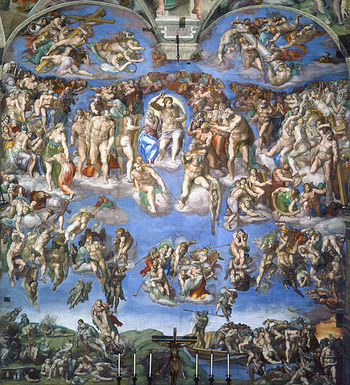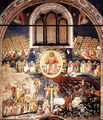Category:Last Judgment (subject)
- @2016 Gabriele Boccaccini, University of Michigan
The idea of the Last Judgment was not shared by all Jews in the Second Temple period. Sadducees and Hellenistic Jews denied the idea of a new creation. God is the Judge but judges all individuals in their lifetime, punishing or awarding them according to their good deeds. There can be some apparent delay in God's punishment or reward, but by the end of their life everybody will receive what they deserve.
Those Jewish groups (Pharisees and Essenes) who expected a new creation, believed that a Last Judgment would occur at the End of Times and would result in the punishment (and destruction) of the sinners and the reward (and salvation) of the righteous.
It was also generally understood that the Last Judgment would be "according to each one's deeds", even though there were discussions and disagreements about which deeds would be considered.
The ancient world did not know the modern principle that "the Law is equal for everyone". The practice and experience of ancient societies was that different laws apply to different people. Therefore, it was commonly accepted the fact that different people would be judged differently even in the Last Judgment. Everything depended on what different people were expected to do. Males and females, free people and slaves, Jews and Gentiles were subjected to different laws.
God was viewed as the supreme Judge, but in some Jewish apocalyptic circles there was a widespread belief that the Last Judgment would be the work of God's Messiah, the Son of Man. Christians claimed that Jesus was the Messiah Son of Man who would return at the end of times as the Final Judge.
The Judgment was understood to be done with Justice and Mercy. Those Jewish groups that stressed the freewill of humans insisted that the Last Judgment was a test of human responsibility. God however would take mercifully into account the good deeds also, and would not limit the judgment to the punishment of transgressions. Apocalyptic groups, who put much more emphasis on the superhuman origin of evil, would rather stress the divine attitude to forgiveness. In the Parables of Enoch (ch.50) it is stated that at the end God would forgive those sinners who repent. Christians believed that God had sent his Messiah Son of Man as the Forgiver.
Salvation in Rabbinic Judaism and Christianity
Salvation is by grace in both religions.
No one is without sins, or at least without some minor transgressions. Therefore if God acted only according to Justice, nobody will be saved in the judgment. But God judges with Mercy.
The righteous is not a person who is without sin but a person whose life is oriented to good.
The rabbis: saved by works
The rabbis had a more optimistic view of the capability of humans to overcome the yetzer hara and live a righteous life.
In the Last Judgment all humans will be judged by God's Mercy and Justice, the Jews according to the Mosaic Torah, the gentiles according to the Noahide Laws
The Christians; Justified by faith, saved by works
The Christians had a more pessimistic view of the power of evil. They thought that the universe was disrupted by a cosmic rebellion of evil forces and that in order to restore the right balance between good and evil God had to sacrifice his own Son (the Messiah) to counterbalance the power of evil. "Justification" (=forgiveness of sin) is a gracious act of God's Mercy, independent from God's Justice. A person who
Even those who are justified are not without sin, but they will be saved if they do not commit any "mortal" sin (idolatry, murder, porneia). Venial sins will be forgiven.
The Last Judgment is "according to deeds" and -- like in Rabbinic Judaism - all humans will judged by Justice and Mercy according to their deeds.
(Explicit) faith in Jesus will be counted to the faithful but it is not required to everybody. At the center of the Last judgment is the love that each individual has demonstrated to his/her neighbors.
Last judgement in Matthew (see Judgment of the Son of Man)
Parable of the Good Samaritan.
The Parable of the Workers in the Vineyard in Christianity and Rabbinic Judaism
Gospel of Matthew
Matthew 20:1-16 (NRSV) -- [1] "For the kingdom of heaven is like a landowner who went out early in the morning to hire laborers for his vineyard. [2] After agreeing with the laborers for the usual daily wage, he sent them into his vineyard. [3] When he went out about nine o'clock, he saw others standing idle in the marketplace; [4] and he said to them, 'You also go into the vineyard, and I will pay you whatever is right.' So they went. [5] When he went out again about noon and about three o'clock, he did the same. [6] And about five o'clock he went out and found others standing around; and he said to them, 'Why are you standing here idle all day?' [7] They said to him, 'Because no one has hired us.' He said to them, 'You also go into the vineyard.' [8] When evening came, the owner of the vineyard said to his manager, 'Call the laborers and give them their pay, beginning with the last and then going to the first.' [9] When those hired about five o'clock came, each of them received the usual daily wage. [10] Now when the first came, they thought they would receive more; but each of them also received the usual daily wage. [11] And when they received it, they grumbled against the landowner, [12] saying, 'These last worked only one hour, and you have made them equal to us who have borne the burden of the day and the scorching heat.' [13] But he replied to one of them, 'Friend, I am doing you no wrong; did you not agree with me for the usual daily wage? [14] Take what belongs to you and go; I choose to give to this last the same as I give to you. [15] Am I not allowed to do what I choose with what belongs to me? Or are you envious because I am generous?' [16] So the last will be first, and the first will be last."
Cf. J Ber 2:5 (Rabbinic version)
To whom can Rabbi Bun bar Rabbi Hiyya be compared? To a king who hired many workers. But there was one worker more efficient in his work than others. What did the king do? . . . Evening arrived and the workers came to collect their pay. The king gave the more efficient worker the same wage as he gave them. The other workers became boisterous and said, “We worked all day long, but this one worked only two hours, but you gave him the same wage!” The king said to them, “This one did more work in two hours than the rest of you did working all day long.” Thus, Rabbu Bun, who labored as a student of the Torah only twenty-eight years became as remarkable as a sage who had studied for a hundred years. (Jerusalem Talmud, Berakhot 2:8, c. 400 C.E.)
The Last Judgment according to Paul
Among the early Christian authors, Paul is the one who more strongly emphasized the "power of evil" and "justification by faith." However, Paul also accepted the fact that the Judgment would be based “on each one’s deeds” (Rom 2:6). The Jews would be judged according to the Mosaic Torah. Gentiles would be judged according to their own conscience (they also know the difference between good and evil and therefore are equally accountable, even thought they are not subjected to the same law as the Jews).
- "There will be anguish and distress for everyone who does evil, the Jews first and also the Greeks, but glory and honor and peace for everyone who does good, the Jews first and also the Greeks. For God shows no partiality" (Rom 2:9-10).
- "All of us must appear before the judgment seat of Christ, so that may receive recompense for what has been done in the body, whether good or evil" (2 Cor 5:10).
But there is a problem. As an apocalyptic Jew Paul had a dramatic understanding of the power of evil. "All, both Jews and Gentiles, are under the power of sin” (3:9-10). There is an advantage of being raised a Jew, and yet both Jews and Gentile are subjected to the power of evil. “Sin came into the world through one man [i.e. Adam]” (5:12). Paul is very pessimistic. Humankind lost their battle with the Devil and are now "slaves of sin." Does it men that no one would be saved in the Last Judgment; not at all, but the condition of slavery makes it very hard for people to be saved, as the slave is at the mercy of an evil master.
Paul, however, is a Christian; he also believes that in order to counterbalance the power of evil God sent his Son as a sacrifice of atonement for forgiveness of sins. "18 Just as one man's trespass led to condemnation for all, so one man's act of righteousness leads to justification and life for all. 19 For just as by the one man's disobedience the many were made sinners, so by the one man's obedience the many will be made righteous" (5:18-19).
Through baptism "sinners" (Jews and Gentiles alike) can receive justification (i.e. forgiveness of sins). “We have been buried with him by baptism into death, so that, just as Christ was raised from the death by the glory of the Father, so we too might walk in newness of life… For whoever had died is freed from sin” (6:3-11).
Justification does not mean "salvation" in the Last Judgment. “Should we continue in sin in order that grace may abound? By no means!” (6:1-2). Justification is a second chance, acquired by faith; Baptized people are expected to live a blameless life. “Should we sin because we are not under the Torah but under grace? By no means!” (6:15). We were “slaves of sin” (6:17), now “we have become “slaves of righteousness” (6:18).
In Paul there are three paths to salvation. Righteous Jews are saved if they follow the commandment of the Torah; righteous gentiles are saved if they follow the voice of their conscience; sinners (Jews and Gentiles alike) are saved if they repent and accept by faith the gift of justification that Jesus offered to everybody through his death.
Gallery
Pages in category "Last Judgment (subject)"
The following 20 pages are in this category, out of 20 total.
1
- Last Judgment (1140 Gislebertus), art
- Last Judgment (1270 Coppo di Marcovaldo), art
- Last Judgment (1306 Giotto), art
- Last Judgment (1371 Prague), art
- Last Judgment (1410 Giovanni da Modena), art
- Last Judgment (1431 Angelico), art
- Last Judgment (1435 Lochner), art
- Last Judgment (1451 Weyden), art
- Last Judgment (1471 Memling), art
- Archangel Michael (1490 Abadia), art
- Last Judgment (1502 Signorelli), art
- Last Judgment (1508 Bosch), art
- Last Judgment (1541 Michelangelo), art
- Last Judgment (1617 Rubens), art
- Last Judgment (1619 Rubens), art
- Last Judgment (1808 Blake), art
- Last Judgment (1853 Martin), art
- Last Judgment (1904 Vasnetsov), art
- Le jugement dans l'évangile de Matthieu (1981 Marguerat), book
Media in category "Last Judgment (subject)"
The following 2 files are in this category, out of 2 total.
- 1999 Yinger.jpg 304 × 499; 17 KB
- 2006 * VanLandingham.jpg 332 × 499; 24 KB


















